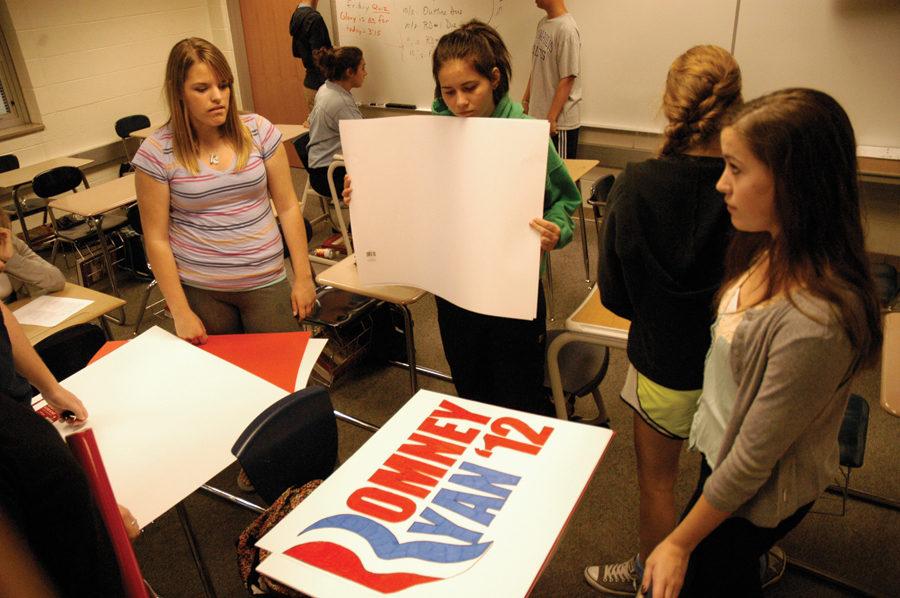Following the elections during SRT on Oct. 29, presidential candidate Mitt Romney was determined to be the winner of the Mock Election. The results for each candidate are the following:
Mitt Romney (R): 969
Barack Obama (D): 765
Gary Johnson (L): 340
Here are the details of the Mock Election:

Every election cycle, one private and one public high school from each of the 50 states are chosen to participate in the National Student Mock Election to simulate as well as stir students’ interest in the presidential election. This school was chosen as Indiana’s public school representative (the private school representative is Cathedral High School).
As a representative, this school will hold a mock election on Monday that all students, regardless of grade or age, will be allowed to vote in. The data from this school will be sent to the National Student Mock Election to predict the results of the “real” Nov. 6 election.
According to history teacher Will Ellery, although he has supervised model elections for high school students in previous election years, this is the first time, in his knowledge, that this school has been chosen as the official public school representative for Indiana.
To complement this historic event, juniors in Ellery’s block class have begun a required project where all students will campaign, during school, for candidates and their respective parties.
As part of the campaign process, students have been displaying posters throughout the second floor of the E hallways. Students will also create campaign commercials of up to 30 seconds in length, debate with other party members and organize campaign rallies–anything within the boundaries of their creativity.
 The point, Ellery said, is to, “appropriately raises the issue for the rest of the student body.”
The point, Ellery said, is to, “appropriately raises the issue for the rest of the student body.”
As part of the assignment, students will assume one of several campaign roles. Each role is specific to categories such as media, research, debate and propaganda. Additionally, each party will have one “campaign coordinator” who was chosen upon the general consensus of the party. He or she will be required to establish a plan and direction for the campaign.
“The campaign coordinator handles the assignment of subcommittees,” Ellery said. “But each of those campaign coordinators took into consideration the interest and skills of the kids and kind of matched up what the kids wanted to do with what was available.”
Natalie Bognanno, campaign coordinator of the Republican Party and junior, said she sees the importance of the mock election to the student body.
“It is the one time in every four years where you get to voice your opinions and decide what you want for your country,” Bognanno said.
According to Ellery, the process of running a political campaign could present a demanding experience for his students.
“Challenging, yes; rewarding, yes; frustrating, yes; one of the things that some students don’t like is how you can only control the outcome so far. A student can control his or her test in a lot of ways… in how much they prepare for it… but when it comes to the election, much is out of your hands,” Ellery said. “Galvanizing the electorate; getting them to see what you see as important: those are things that can’t necessarily be controlled, and that can be frustrating.”
On Monday, voting day, all students at this school will be given the opportunity to vote for one of the three parties. These results will be calculated by the block students and sent to the National Student Mock Election to represent the public schools of Indiana.

“Part of (the campaign) is having to mirror the real election, and if kids that day opt not to vote for whatever reason… then their vote won’t count,” Ellery said. “(It) will be the same as what will happen in the real election anyway.”
Ellery said that despite the struggles this activity may present, he believes the mock election will provide his students and the entire student body an educating experience about the election.
“The students themselves that are mine will get a credible education of the election process, and, really, how to coordinate and move an issue forward, not just politically, but in any arena,” Ellery said. “The rest of the students, hopefully, will get an educational insight into the election process and what is happening nationally.”

































![AI in films like "The Brutalist" is convenient, but shouldn’t take priority [opinion]](https://hilite.org/wp-content/uploads/2025/02/catherine-cover-1200x471.jpg)









































![Review: “The Immortal Soul Salvage Yard:” A criminally underrated poetry collection [MUSE]](https://hilite.org/wp-content/uploads/2025/03/71cju6TvqmL._AC_UF10001000_QL80_.jpg)
![Review: "Dog Man" is Unapologetically Chaotic [MUSE]](https://hilite.org/wp-content/uploads/2025/03/dogman-1200x700.jpg)
![Review: "Ne Zha 2": The WeChat family reunion I didn’t know I needed [MUSE]](https://hilite.org/wp-content/uploads/2025/03/unnamed-4.png)
![Review in Print: Maripaz Villar brings a delightfully unique style to the world of WEBTOON [MUSE]](https://hilite.org/wp-content/uploads/2023/12/maripazcover-1200x960.jpg)
![Review: “The Sword of Kaigen” is a masterpiece [MUSE]](https://hilite.org/wp-content/uploads/2023/11/Screenshot-2023-11-26-201051.png)
![Review: Gateron Oil Kings, great linear switches, okay price [MUSE]](https://hilite.org/wp-content/uploads/2023/11/Screenshot-2023-11-26-200553.png)
![Review: “A Haunting in Venice” is a significant improvement from other Agatha Christie adaptations [MUSE]](https://hilite.org/wp-content/uploads/2023/11/e7ee2938a6d422669771bce6d8088521.jpg)
![Review: A Thanksgiving story from elementary school, still just as interesting [MUSE]](https://hilite.org/wp-content/uploads/2023/11/Screenshot-2023-11-26-195514-987x1200.png)
![Review: "When I Fly Towards You", cute, uplifting youth drama [MUSE]](https://hilite.org/wp-content/uploads/2023/09/When-I-Fly-Towards-You-Chinese-drama.png)
![Postcards from Muse: Hawaii Travel Diary [MUSE]](https://hilite.org/wp-content/uploads/2023/09/My-project-1-1200x1200.jpg)
![Review: "Ladybug & Cat Noir: The Movie," departure from original show [MUSE]](https://hilite.org/wp-content/uploads/2023/09/Ladybug__Cat_Noir_-_The_Movie_poster.jpg)
![Review in Print: "Hidden Love" is the cute, uplifting drama everyone needs [MUSE]](https://hilite.org/wp-content/uploads/2023/09/hiddenlovecover-e1693597208225-1030x1200.png)
![Review in Print: "Heartstopper" is the heartwarming queer romance we all need [MUSE]](https://hilite.org/wp-content/uploads/2023/08/museheartstoppercover-1200x654.png)




